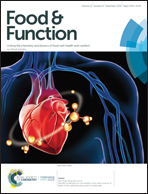Impact of traditional Chinese medicine treatment on chronic unpredictable mild stress-induced depression-like behaviors: intestinal microbiota and gut microbiome function†
Abstract
Gut microbiota dysbiosis is a recognized contributing factor to many noncommunicable diseases, but more evidence is still needed to illustrate its causative impact on mental and brain health disorders and mechanism(s) for targeted mitigation. Traditional Chinese Medicine (TCM) has been used in the management of neuropsychiatric diseases for many years in China. In this study, a randomized, controlled trial was conducted to examine the impact of stress on gut microbiota dysbiosis and depression, and TCM in alleviating the damage using Chronic Unpredictable Mild Stress (CUMS) rats, a well-established rodent model for depression. The behaviors of rats and the profiles of the fecal microbiota were assessed by an array of behavioral tests and 16S rRNA gene sequencing, and the intestinal microbial function was assessed by shotgun sequencing-based metagenomic analysis of microbial DNA from fecal samples. Data on brain targeted metabolites by liquid chromatography-mass spectrometry (LC-MS) were also discussed. Depressive and anxiety-like behaviors and changes in the fecal microbiota profile were observed in CUMS rats, which were then significantly reversed in CUMS rats that received TCM. Specifically, TCM treatment reduced the levels of Firmicutes, and Ruminococcus, and increased the abundance of Bacteroidetes and Roseburia, reportedly being associated with relieving psychiatric disorders. Furthermore, the levels of brain metabolites perturbed by CUMS were reversed by TCM treatment, and Spearman's correlation analysis illustrated strong correlation between brain metabolites and perturbed fecal microbiota genera. Finally, the fecal microbiome of CUMS rats was characterized by alterations in amino acid metabolism and evaluation of bile acid biosynthesis, and TCM-treated rats showed elevation of cysteine and methionine metabolism. Overall, these results indicated that administration of the TCM may mitigate CUMS-induced depression-behaviors, and it is correlated with reversing CUMS-induced intestinal microbiota dysbiosis; evidence also supported related changes in brain metabolites. These findings set up the foundation to further reveal the exact causal relationship among the TCM formula, host responses, gut microbiota dysbiosis and the levels of brain metabolites, and enabled scientific interpretation of the therapeutic function of the TCM.



 Please wait while we load your content...
Please wait while we load your content...
